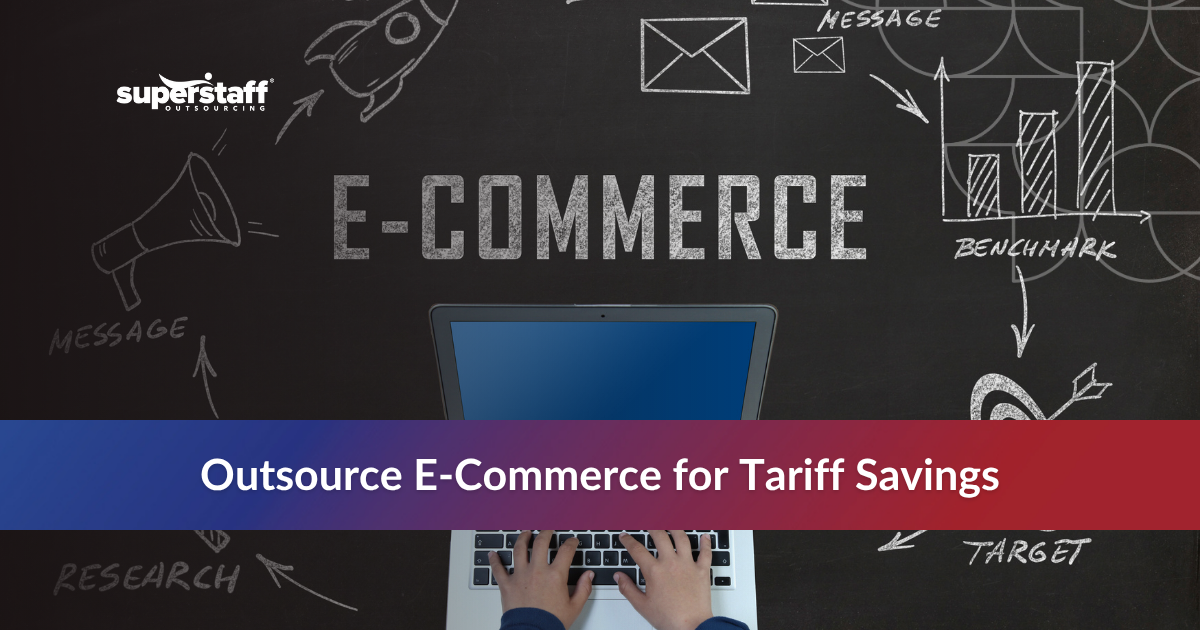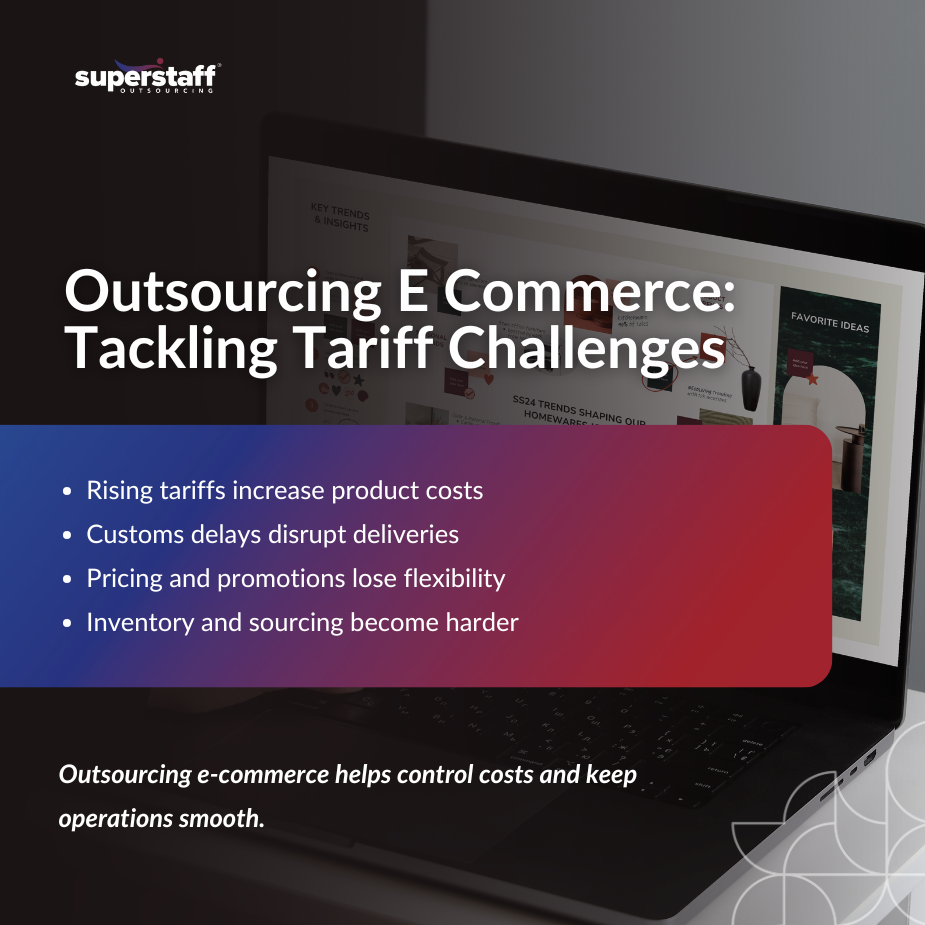
Tariffs and shipping costs are making it harder for many e-commerce businesses to keep prices low and deliveries on time. With trade rules changing and fees going up, online sellers need better ways to run their operations without extra costs or delays.
Many e-commerce brands are finding that outsourcing key tasks can save money and make work easier. Outsourcing helps with managing tariffs, speeding up customer service, and growing the business without getting overwhelmed.
By outsourcing e-commerce services, brands can handle tariff problems, improve how their supply chains work, and expand faster—without spending a lot on new equipment or staff.
The Tariff Problem in E-commerce

Rising tariffs on imported goods are causing several problems for online retailers:
- Higher costs for raw materials and finished products
- Delays at customs that disrupt delivery timelines
- Less flexibility in pricing and promotions
- Difficulty planning inventory and sourcing
These challenges are especially tough for businesses that rely on international suppliers. Even a small tariff increase can cut into already thin profit margins.
That’s why many sellers are shifting from in-house operations to outsourcing e commerce tasks. This move helps reduce risks, control costs, and maintain reliable customer service and fulfillment.
What Are E-commerce Brands Outsourcing?
More businesses are seeing the value in outsourcing common e-commerce functions. Here are four areas where outsourcing is becoming more common:
1. Fulfillment and Warehousing
Third-party logistics (3PL) providers assist e-commerce businesses by storing products, packing orders, and managing shipping. These providers often operate warehouses in multiple countries, which helps make international deliveries faster and more affordable.
By partnering with e-commerce logistics companies, brands gain access to efficient delivery systems without the high costs of building and maintaining their own facilities.
2. Customer Support
Many e-commerce brands outsource their customer service to teams that work around the clock. This approach helps reduce overhead costs while improving response times and customer satisfaction. Outsourced support teams often offer services in multiple languages and across different time zones, providing a better overall experience for customers worldwide.
3. Product Sourcing and Procurement
E-commerce companies frequently collaborate with offshore agents or sourcing firms to find suppliers that offer cost-effective products. These partners support negotiations, ensure quality control, and manage vendor relationships. Outsourcing sourcing and procurement becomes especially valuable when brands need to adjust to new tariffs or switch suppliers to maintain competitive pricing.
4. Administrative and Back-Office Tasks
Routine functions such as data entry, returns processing, and inventory updates are commonly outsourced. This allows internal teams to focus on more strategic activities like sales, marketing, and product development. Outsourcing these administrative tasks helps businesses improve efficiency without increasing overhead.
All of these are examples of outsourcing e-commerce tasks to improve performance without expanding overhead.
Why Smarter Outsourcing Works for E-commerce
Outsourcing e-commerce functions provides several clear benefits. Here’s why many online sellers are making the shift:
- Lower labor and facility costs: Outsourced teams handle operations without the need to hire or train staff
- Faster market entry: With local fulfillment partners, brands can start selling in new countries quickly
- Scalable operations: Businesses can adjust their operations based on sales volume without large investments
- Access to expertise: Outsourced teams bring experience in logistics, customer support, and international trade
These benefits help brands stay flexible, especially when facing economic uncertainty or changing trade rules. Many are turning to e-commerce logistics solutions that give them greater control while reducing fixed costs.
How Outsourcing Helps Manage Tariff Challenges
Outsourcing supply chain management to navigate tariff challenges is a growing strategy among e-commerce brands. Here’s how it works:
1. Fulfillment in Trade-Friendly Countries
- Companies avoid high tariffs by shipping products to countries with trade agreements
- For U.S. brands, this often means nearshoring to Mexico or Colombia under agreements like USMCA
- Fulfillment can then happen in those countries before products are sent to their final destination
2. Sourcing Outside of China
- Tariffs on Chinese goods have pushed some brands to source from countries like Vietnam, Thailand, or the Philippines
- These countries often offer competitive production costs with fewer restrictions
3. Regional Fulfillment Centers
- Some companies set up fulfillment hubs in target regions (e.g., Europe, Southeast Asia)
- This helps speed up delivery and reduces duties on cross-border shipments
4. Localized Customer Support
- Customer service centers in key regions can improve communication and meet regional service expectations
- Support teams can handle local tax, shipping, or regulatory issues more effectively
5. Compliance Support
- Many brands work with outsourcing partners to manage customs paperwork, duties, and shifting trade policies
- These experts help avoid delays and keep operations running smoothly
All of these are examples of how outsourcing e-commerce services helps reduce the impact of trade barriers.
Global Locations That Help Offset Tariff Costs
Choosing the right outsourcing locations can have a direct impact on costs. Here are a few examples of regions that e-commerce companies are working with:
- Mexico and Colombia – Popular among U.S. brands for nearshoring due to trade agreements and lower shipping times
- Vietnam and the Philippines – Known for affordable manufacturing, strong English-speaking talent, and growing infrastructure
- Eastern Europe – Offers a good mix of skilled labor and access to EU markets
- India – A key destination for outsourcing customer service, tech support, and back-office tasks
Working with trusted providers in these regions allows e-commerce businesses to maintain product quality, reduce shipping costs, and meet local delivery standards.
Whether you’re looking for better sourcing options or quicker delivery routes, outsourcing e-commerce services across global regions can offer strong advantages.
Grow Smart, Spend Less
E-commerce brands facing global trade pressures are outsourcing smarter to reduce costs and grow efficiently. From warehousing to customer support, outsourcing e-commerce tasks helps online sellers stay competitive without adding new overhead. This approach lets brands focus on growth while experts manage logistics, sourcing, and fulfillment.
Tariffs and fees continue to impact profits for online retailers. Outsourcing offers a flexible, cost-effective way to handle fulfillment and supply chains. Working with global providers helps reduce delays and control costs. Choosing the right partners improves service quality while supporting business growth.
SuperStaff helps e-commerce businesses scale by providing expert outsourcing e-commerce services in logistics, customer support, and back-office operations. If you’re ready to simplify your processes and lower costs, reach out to learn how we can support your next phase of growth.






